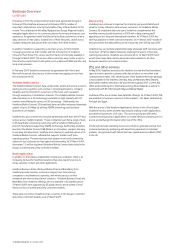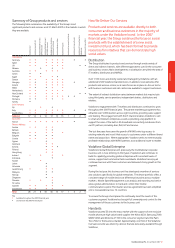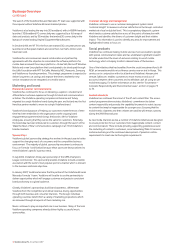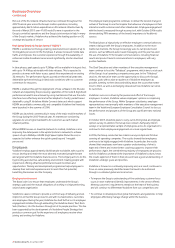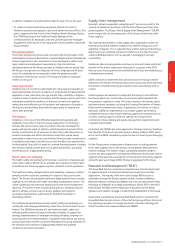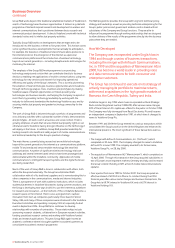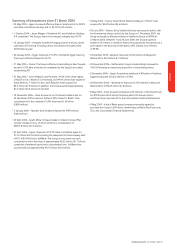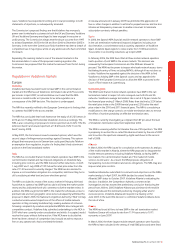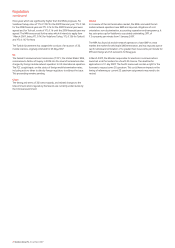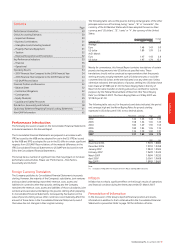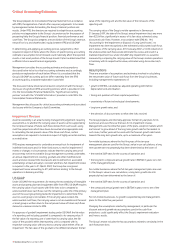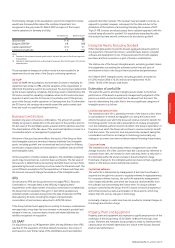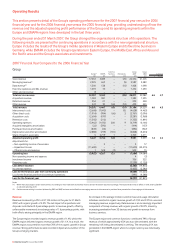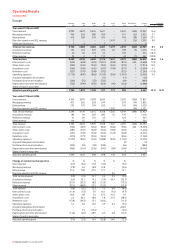Vodafone 2007 Annual Report Download - page 28
Download and view the complete annual report
Please find page 28 of the 2007 Vodafone annual report below. You can navigate through the pages in the report by either clicking on the pages listed below, or by using the keyword search tool below to find specific information within the annual report.26 Vodafone Group Plc Annual Report 2007
Regulation
continued
1 million each. Vodafone Greece has filed an administrative appeal and a
hearing has been held.
In January 2007, Vodafone Greece was fined 76 million by the
Administrative Authority for Secrecy of Communications (“ADAE”) having
been made aware of a security issue in its network. Software foreign to the
network and capable of intercepting calls had been installed without
Vodafone’s knowledge in the network software created, supported and
maintained by an external supplier. The foreign software was removed
without delay and the Greek authorities were promptly informed. Vodafone
Greece has paid the fine but is appealing against the decision. Due to the
interception incident, the NRA has required Vodafone Greece to give its
views on any breach of the Greek electronic communications legislation,
including breach of privacy and secrecy of communication.
Ireland
In its review of the call termination market, the NRA has found that all
mobile network operators have SMP. The NRA has imposed obligations of
cost orientation and non-discrimination on all operators and obligations of
accounting separation and transparency on Vodafone and O2. Vodafone
Ireland has agreed to reduce its rates by 11% below the retail price index per
annum for the 24 months commencing January 2006.
The NRA is conducting a second review of the access market. The previous
joint SMP designation of Vodafone and O2was annulled on appeal.
The fixed incumbent, eircom, which also owns Meteor, Ireland’s third largest
mobile operator, was awarded the fourth 3G licence in March 2007.
Malta
In the call termination market, the NRA has found both mobile network
operators as having SMP and has imposed obligations on Vodafone Malta of
cost orientation, non-discrimination, accounting separation and
transparency. Vodafone Malta reduced its mobile termination rates from
4.65 Maltese cents per minute in January 2006 to 4.39 Maltese cents and
will further reduce the rates to 4.13 Maltese cents in January 2008. The NRA
has found Vodafone and Go Mobile, the two Maltese mobile network
operators, as having joint SMP in the access market and proposes to impose
an obligation to offer cost based access to MVNOs.
The Netherlands
The NRA had proposed that all operators have SMP and proposed remedies
of cost orientation, non-discrimination and transparency. The NRA’s
proposal was appealed and its proposal was rejected by the court. The NRA
is currently rerunning its review of the call termination market and proposes
that Vodafone Netherlands reduce its rates to 0.07 by 1 July 2009 from
0.11 currently with the cuts phased over two years from 1 July 2007.
In March 2007, the Government decided to extend the 2G 900 MHz licences
which expire in 2010. The Vodafone Netherlands licence will be extended
for three years at a total price of 36.5 million, to be paid in yearly
instalments from March 2010.
The deadline to comply with 3G licence coverage obligations has been
postponed from January 2007 to September 2007. A consultation is
expected before then on the interpretation of the roll-out obligations.
The Ministry is consulting on proposals to licence 3G extension band
spectrum at 2.6 GHz.
Portugal
Following its review of the call termination market, the NRA found all three
mobile network operators as having SMP and has imposed obligations on
Vodafone Portugal including cost orientation, non-discrimination,
accounting separation and transparency. In October 2006, Vodafone
Portugal reduced its mobile termination rates in the final step of the
regulated glidepath to 11 eurocents.
The NRA’s analysis of the access market is expected to take place in 2007.
Vodafone Portugal has had its 2G licence renewed for a period of 15 years
from October 2006 with terms which remain essentially unchanged from
those which previously applied.
In October 2006, the NRA approved a change to the terms of Vodafone
Portugal’s licence to allow the provision of the Vodafone Casa service.
EMAPA
Australia
Vodafone Australia’s appeal of the NCA’s decision requiring Vodafone
Australia’s mobile termination rates to fall from 21 Australian cents per
minute to 12 Australian cents per minute for the period 2005 to 2007 was
rejected by the Australian Competition Tribunal. The NRA is now in the
process of setting rates for the period July 2007 to June 2009.
Czech Republic
In February 2005, Vodafone Czech Republic was awarded a 3G licence. The
EU investigated a complaint but concluded in December 2006 that the
award did not breach EU competition law.
In its review of the call termination market, the NRA has proposed that all
mobile network operators have SMP and has imposed obligations of cost
orientation, non-discrimination, accounting separation and transparency.
Vodafone Czech Republic complied with a requirement to reduce its call
termination rates from July 2006 by 4% from CZK 3.11 per minute to CZK
2.99 per minute. In its review of the access market, the NRA found that no
mobile network operator had SMP.
Egypt
In July 2006, the Government awarded a third mobile licence to Etisalat,
which enables both 2G and 3G services, and awarded a 3G mobile licence to
Vodafone Egypt in January 2007. Mobile number portability and national
roaming are expected to be implemented in Egypt in 2007 and are the
subject of continuing discussions with the NRA.
Fiji
During 2006, the Fijian Government proceeded with proposals to remove
exclusive rights and began a process of consultation with Vodafone Fiji
regarding potential compensation for the loss of exclusivity. In December
2006, the Government was removed and the interim Government is
considering how best to proceed with telecommunications reform.
Hungary
In its second review of the call termination market, the NRA has proposed
that all mobile network operators have SMP and has imposed obligations of
cost orientation, non-discrimination, accounting separation and
transparency. Vodafone Hungary had appealed similar findings following the
first review. In May 2005, Vodafone Hungary complied with a requirement
following the first review to reduce its call termination rates by 16%.
Subsequently the NRA has required Vodafone to reduce its rates in a series
of steps to 16.84 HUF by 1 January 2009. Vodafone Hungary has appealed
these decisions.
India
In April 2007, the Department of Telecommunications (“DoT”) completed
the tender process to issue subsidies from the universal service fund for
provision of infrastructure and mobile services in specified rural and remote
areas.
In April 2007, the NRA also submitted Recommendations on Infrastructure
Sharing to the DoT, which recommended that licensees be permitted to
commercially agree “active” infrastructure sharing arrangements. This
would include Node Bs, Radio Access Networks, and backhaul between Base
Transceiver Stations and the Base Station Controller, but not spectrum. The
DoT is considering the NRA’s Recommendations.


